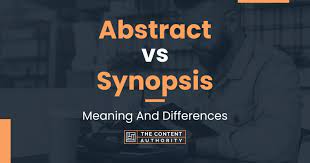The Difference Between Thesis Abstract and Synopsis for Ph.D.

Understanding the Difference Between Thesis Abstract and Synopsis for Ph.D.
When embarking on the journey of a Ph.D., one encounters various academic terms and requirements that might seem similar but serve distinct purposes. Two such elements that often cause confusion are the "thesis abstract" and "synopsis." In this brief blog post, we'll delve into the key differences between a thesis abstract and a synopsis for a Ph.D.
1. Thesis Abstract: A Snapshot of Your Research
The thesis abstract serves as a concise summary of your entire research work. It encapsulates the essence of your thesis in a limited word count, typically ranging from 150 to 300 words. The abstract provides a snapshot of your research question, methodology, major findings, and conclusions. It serves as a standalone piece, allowing readers to grasp the core aspects of your study without delving into the entire thesis.
2. Synopsis: A Comprehensive Overview of Your Thesis
On the other hand, a synopsis is a more comprehensive document that outlines the entire thesis in detail. It is not just a summary but a structured representation of your research. A synopsis typically includes the introduction, literature review, research objectives, methodology, findings, and conclusion. It offers a more in-depth understanding of the thesis, acting as a guide for evaluators and researchers to assess the scope and depth of your work.
3. Purpose and Audience
Thesis Abstract:
- Purpose: To provide a quick overview of the research.
- Audience: Readers who want a brief understanding without delving into the complete thesis.
Synopsis:
- Purpose: To comprehensively present the structure and content of the thesis.
- Audience: Thesis evaluators, potential collaborators, and researchers seeking detailed information.
4. Length and Detailing
Thesis Abstract:
- Length: Short, typically 150 to 300 words.
- Detailing: Briefly touches on the research question, methodology, major findings, and conclusions.
Synopsis:
- Length: Longer, often several pages.
- Detailing: Covers all major sections of the thesis, providing a detailed overview of each component.
5. When They Are Presented
Thesis Abstract:
- Presented at the beginning of the thesis.
- Often used in academic publications and databases.
Synopsis:
- Presented separately before the thesis defense.
- Helps evaluators understand the scope before reviewing the complete thesis.
Conclusion:
In summary, while both the thesis abstract and synopsis aim to communicate the essence of a Ph.D. thesis, they serve different purposes. The abstract is a brief standalone summary, whereas the synopsis is a more detailed document that outlines the entire research. Understanding these differences is crucial for effectively presenting and communicating your research in the academic realm.
This brief blog post clarifies the distinctions between a thesis abstract and a synopsis, aiding Ph.D. candidates in effectively communicating their research to different audiences.
FAQs (Frequently Asked Questions):
Q: What is the primary purpose of a thesis abstract?
- A: The thesis abstract serves as a concise summary, providing a snapshot of the research's key elements within a limited word count.
Q: How long is a typical thesis abstract?
- A: Thesis abstracts are typically short, ranging from 150 to 300 words.
Q: What information does a thesis abstract include?
- A: A thesis abstract includes the research question, methodology, major findings, and conclusions.
Q: When is a thesis abstract presented?
- A: The thesis abstract is usually presented at the beginning of the complete thesis.
Q: What is the purpose of a synopsis for a Ph.D. thesis?
- A: A synopsis provides a comprehensive overview of the entire thesis, offering a detailed representation of the research.
Q: How long is a typical synopsis for a Ph.D. thesis?
- A: A synopsis is longer, often spanning several pages to cover all major sections of the thesis.
Q: Who is the audience for a thesis abstract?
- A: The thesis abstract is for readers who seek a brief understanding without delving into the complete thesis.
Q: Who typically reviews a synopsis for a Ph.D. thesis?
- A: A synopsis is reviewed by thesis evaluators, potential collaborators, and researchers seeking detailed information.
Conclusion:
In conclusion, understanding the nuances between a thesis abstract and a synopsis is vital for Ph.D. candidates. The abstract provides a brief snapshot, while the synopsis offers a detailed representation of the entire research, catering to different audiences and purposes.
